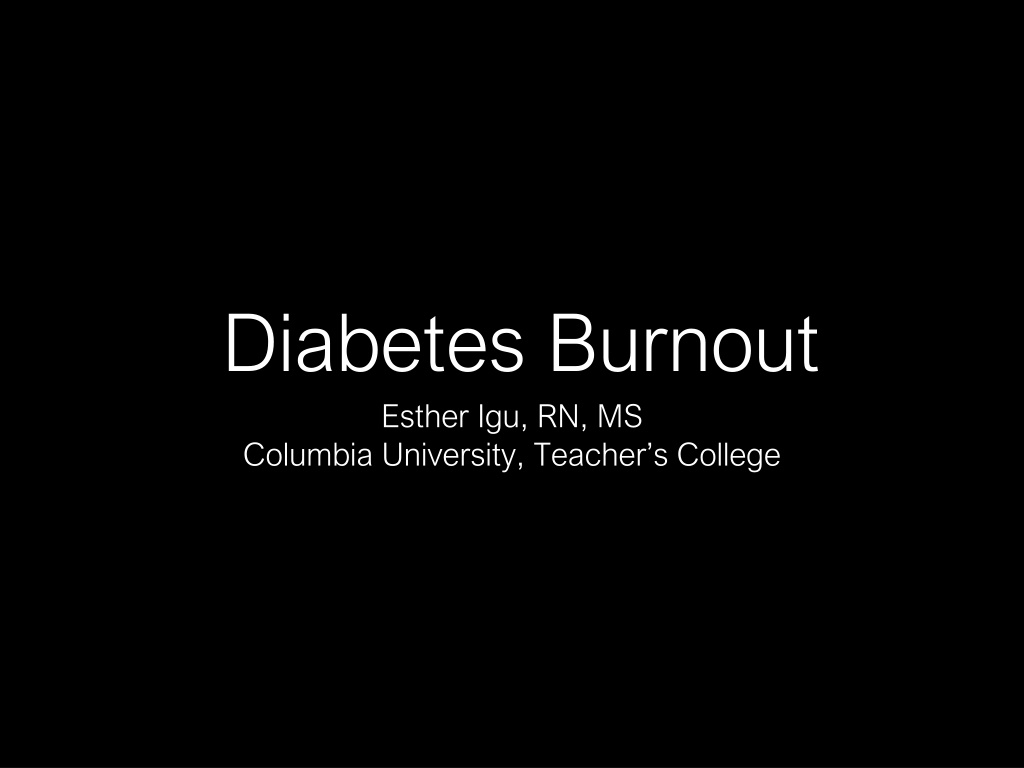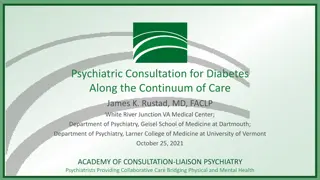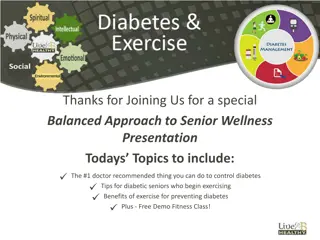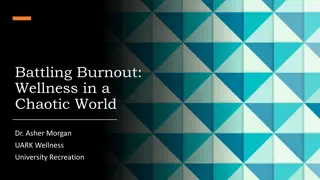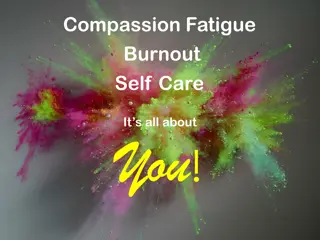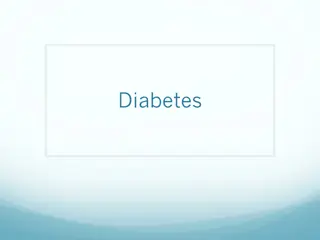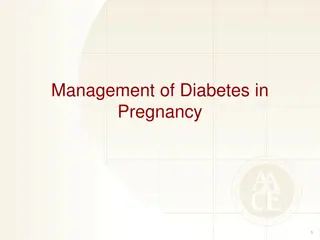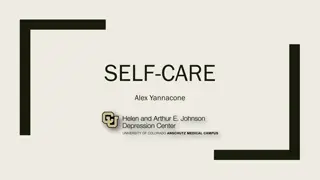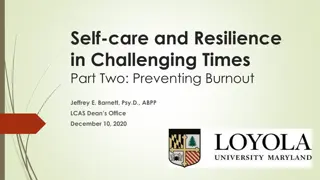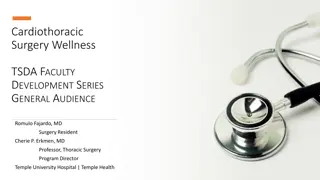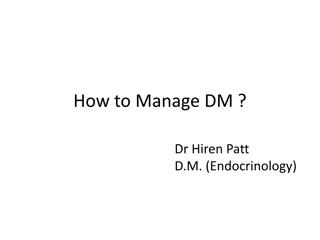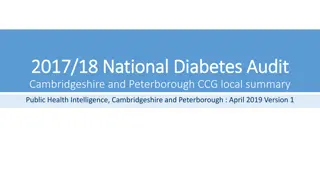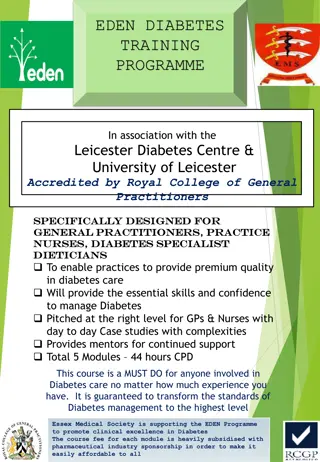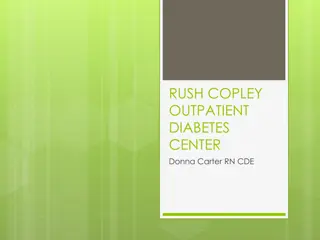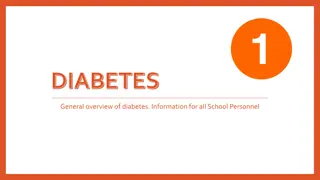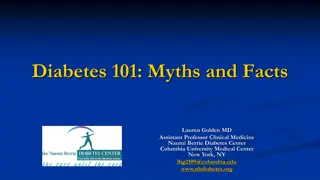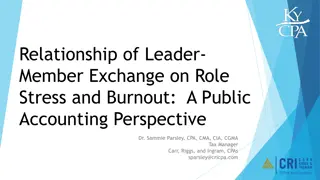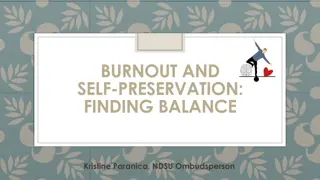Understanding and Addressing Diabetes Burnout in Self-Care
Diabetes burnout can significantly impact an individual's ability to manage their condition effectively. Recognizing signs of burnout, understanding barriers to self-care, and implementing strategies to overcome them is crucial for improved well-being. This includes developing a clear meal plan, modifying the eating environment, and focusing on positive habits. By addressing personal, interpersonal, and environmental barriers, individuals can better navigate the challenges of diabetes management and regain control over their health.
Download Presentation

Please find below an Image/Link to download the presentation.
The content on the website is provided AS IS for your information and personal use only. It may not be sold, licensed, or shared on other websites without obtaining consent from the author. Download presentation by click this link. If you encounter any issues during the download, it is possible that the publisher has removed the file from their server.
E N D
Presentation Transcript
Diabetes Burnout Esther Igu, RN, MS Columbia University, Teacher s College
Objectives/Overview: Diabetes burnout definition, signs and symptoms Barriers to self-care that influence burnout Strategies for addressing burnout Tips for interacting with the healthcare team Tips for caregivers Summary/conclusion
Have you ever Persistently taken less doses of prescribed medication? Injectables or oral agents Stopped monitoring your blood sugar levels against the medical team s recommendations? To spite your diabetes, or someone specific in your family? Eaten a whole bag of candy in one sitting? Felt like you were working a thankless job where you are not the clock 24/7 with no vacation, crappy pay and bosses that do not acknowledge your efforts or progress? Do you constantly feel disillusioned, frustrated by your diabetes and feel like you want to quit?
If you answered yes to some or all of the previous questions, you may be experiencing diabetes burnout
You are not alone An ADA survey found that: 21% of adults with Type 1 diabetes(T1DM) never checked their blood glucose Of those insulin-treated patients with Type 2 Diabetes(T2DM), 47% never monitored their blood glucose Among those with T2DM who were not using insulin, 76% never checked blood glucose
Barriers to self-care that influence burnout Personal barriers Interpersonal barriers Environmental barriers
Addressing burnout: Overcoming barriers to following a healthy meal plan Develop a meal plan that is clear and reasonable Modify your eating environment to support you Focus on new habits you are planning to start, not old habits you are trying to stop Use assertiveness strategies in challenging social situations Structured eating/ splurge plan Think of the whole: in the face of disappointments
Addressing burnout: Strategies to overcoming barriers to blood glucose monitoring Have a talk with your meter: Changing your language could change your perceptions - use monitor instead of test use high or low instead of bad or good. Set realistic blood glucose targets Make your environment work for you Make use of the information obtained from monitoring
Addressing Burnout: Strategies to overcoming barriers to exercise Seek out physical activities that are fun, enjoyable or rewarding Modify your environment Develop a concrete plan that is reasonable for you: low-hanging fruit Get an exercise buddy if you can
Strategies for building better relationships with HCP s Prepare for visits Ask about the results! Assertiveness, brevity and clarity Be an active participant in deciding in changes in your diabetes care regimen/plan Choose a healthcare provider you trust Take the risk of being open and honest Be aware of the pressures that the healthcare team operates under
Tips for caregivers: Dos and Don ts Don t assume you know what they are thinking or feeling - just ask! Do try to understand their actions from their perspective: Put yourself in their shoes Don t offer advice unless asked Do offer help Do remind him or her that you love them Do get educated
Conclusion/Summary/Quest ions? Set realistic and specific goals that are concrete and measurable Ask for help Realize that you are not alone Seek personal and professional help Utilize your online diabetes community
References Polonsky, W. (1999). Diabetes Burnout: What to do when you can t take it anymore. Virginia: American Diabetes Association.
